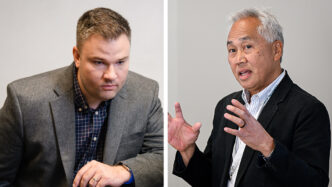Clemson University senior Katie Graziano learned during a summer internship that becoming a licensed professional engineer could create opportunities in construction management she hadn’t considered.
“It’s not just about the pay bump—it’s really about the doors it opens,” Graziano said. “Having a PE gives you the ability to take more ownership, work more efficiently, and add more value to a company, which is what excites me most.”
A growing number of Clemson engineering students like Graziano are taking and passing the Fundamentals of Engineering (FE) exam, the first step to becoming a licensed professional engineer.
The number of Clemson students sitting for the exam more than doubled in the past three years, climbing from 172 in 2021–22 to 360 in 2024–25. Despite the surge, the pass rate barely budged, dipping only slightly from 83% to 81%. That’s still more than 10 points higher than the national average.
The numbers underscore that Clemson is preparing students for the professional world, said Brandon Ross, the J. Richard ’66 and Nancy W. Cottingham Distinguished Professor of Civil Engineering.

“Just like you wouldn’t want to go to a doctor who isn’t licensed or a lawyer who hasn’t passed the bar, you don’t want an engineer approving plans without a license,” Ross said. “We’re helping our students take that first step to becoming Professional Engineers.”
While the exam isn’t required for Clemson graduation, many engineering students are encouraged to take it as seniors and recent graduates so that the fundamentals they have learned will still be fresh in their minds.
Ryan Cox, a senior majoring in civil engineering, has put himself on track for licensure by signing up for an FE-prep class taught by Ross.
“I feel like it will give me a sort of freedom when I’m there in my career– to start my own projects, to put my name on something,” he said. “For me, that’s the main motivation.”
The FE exam is administered by the National Council of Examiners for Engineering and Surveying (NCEES), headquartered in Greenville.
Passing the FE exam qualifies graduates to apply to become Engineers in Training, putting them on the path to full Professional Engineer licensure. Licensure in South Carolina is governed by the state Board of Registration for Professional Engineers and Surveyors.
Funding from the board’s umbrella agency, the state Department of Labor, Licensing and Regulation, covered exam fees for 285 Clemson students last year.
Ross credits that investment, along with a growing culture of preparation, for keeping pass rates high even as more students sign up. Among those efforts is a one-credit civil engineering class aimed at reviewing fundamentals and preparing students for the exam.
The exams are offered for seven areas of engineering: chemical, civil, electrical and computer, environmental, industrial and systems, mechanical and other disciplines. The civil engineering exam attracts the biggest turnout among Clemson students.
“Engineering is more than problem-solving — it is a public trust,” said Aubrey Baldwin, executive director of student experience in the College of Engineering, Computing and Applied Sciences. “When our students take the FE exam and pursue licensure, they affirm they have the knowledge, judgment, and responsibility to serve society with integrity.”
O. Thompson Mefford, associate dean for undergraduate studies, said the steady results show the long-term impact of philanthropy.
“Dick and Nancy Cottingham set the example,” Mefford said. “Their support has elevated the culture of professional licensure within the college and is providing Clemson students with a distinct advantage as they prepare to launch their careers.”
The Cottinghams have championed professional licensure for decades, giving $500,000 to endow a professorship currently held by Ross and continuing to fund outreach and test prep.
Cottingham, a 1966 Clemson civil engineering graduate, rose to the rank of captain in the Navy Civil Engineer Corps, founded and led successful engineering firms and served as national president of NCEES.
Ross said the Cottinghams’ vision still drives his work.
“They wanted every Clemson engineer to have the chance to be licensed,” Ross said. “What we’re seeing now is exactly what they hoped for– more students taking the exam and proving themselves ready.”
The culture the Cottinghams have played a central role in fostering is making a positive difference for students like Kara Kraczon, a senior civil engineering major who signed up for the FE-prep class and plans to sit for the exam in December.
“Even though it’s not a requirement for graduation, I just don’t know anybody that’s not taking it,” Kraczon said. “If I did hear somebody say, ‘No, I’m not taking that,’ I’d ask, ‘why not?’ It just seems like that’s the norm.”
More information:
Programs supporting the advancement of engineering licensure will continue this academic year. Current students may access resources around the FE here.








